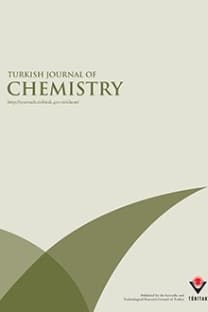A simple and efficient approach for preconcentration of some heavy metals in cosmetic products before their determinations by flame atomic absorption spectrometry
In the current study, a simple and efficient analytical method for preconcentration and determination of Cd(II), Pb(II), and Sn(II) in some cosmetic samples, using ultrasonic assisted-cloud point extraction and flame atomic absorption spectrometry, was developed. The method is based on the ternary complex formations of Sn(II), Pb(II), and Cd(II), which are available in the form of neutral and/or anionic hydroxo complexes (Sn(OH)$_{3}^{-}$, Pb(OH)$_{3}^{-}$, Cd(OH)$_{2}$, and/or Cd(OH)$_{3}^{-})$, with Victoria Pure Blue BO (VPB$^{+})$ in the presence of cetylpyridinium chloride at pH 8.5, and then extraction of the formed ternary complexes into the micellar phase of polyoxyethylene sorbitan monostearate (Tween 60). Using the optimized conditions, a linear relationship was observed in the ranges of 12-330 $\mu $g L$^{-1}$ for Cd(II), 4-200 $\mu $g L$^{-1}$ for Pb(II), and 1-275 $\mu $g L$^{-1}$ for Sn(II). The detection limits for Cd(II), Pb(II), and Sn(II), respectively, were 3.70, 1.35, and 0.45 $\mu $g L$^{-1}$, with a preconcentration factor of 50, and the precision as relative standard deviations was lower than 4.2% for each analyte. The validity was verified by analysis of two certified reference materials. Finally, the method was successfully applied to the determination of these metals in various cosmetic samples.
Keywords:
Extraction, green chemistry, heavy metals, pollution spectroscopy, surfactants,
- ISSN: 1300-0527
- Yayın Aralığı: Yılda 6 Sayı
- Yayıncı: TÜBİTAK
Sayıdaki Diğer Makaleler
Sibel Tunali AKAR, Sema ÇELİK, Dilek TUNÇ, Yasemin Yetimoğlu BALK, Tamer AKAR
Süreyya Oğuz TÜMAY, Murat YAZAR, Duygu ÖZDEŞ, Hakan BEKTAŞ, Celal DURAN
Mohamed E. MAHMOUD, Amr A. YAKOUT, Asmaa M. HALBAS, Maher M. OSMAN
RAFAEL VASCONCELOS OLIVEIRA, UELBER SILVA VIEIRA, MARDSON VASCONCELOS MACIEL, THAIS SOUZA NERI, GRAZIELE SANTOS SALES, REBECA MORAES MENEZES, VALFREDO AZEVEDO LEMOS
Murat KOLUMAN, Feyzullah TOKAY, Sema BAĞDAT
Barbara LESNIEWSKA, İwona JAKUBOWSKA, Elzbieta ZAMBRZYCKA, Beata Godlewska - ZYLKIEWICZ
